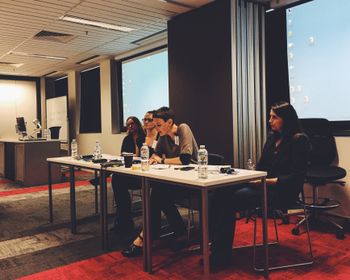UNSETTLE: An SNS Roundtable Series
IABA Asia Pacific December 1-3, 2015
The third instalment of our Unsettle series took place on December 3, 2015 at "Locating Lives" (Flinders University, Adelaide, South Australia)
Panel members: Pamela Graham, Daniella Trimboly, Kate Douglas and Anna Poletti
Panel moderator: Emma Maguire
Locating Lives: The IABA Asia-Pacific Inaugural Conference.
Locating Lives, the inaugural conference for the IABA Asia-Pacific chapter took place in Adelaide, South Australia from 1-3 December, 2015. The conference was co-organised by Associate Professor Kate Douglas and Dr. Kylie Cardell, both of Flinders University, and featured keynotes by Professor Gillian Whitlock (University of Queensland), Professor Craig Howes (University of Hawai’i), and Australian author Benjamin Law.
Professor Whitlock’s keynote opened the conference. Her presentation, titled “Salvage,” explored life narratives around the boat as a key object of concern and interest in this oceanic region. Beginning with the maritime museum and raising tensions around Asylum seeker and migrant narratives, Whitlock emphasised that life narrative has been central to how ideas, affects, histories, and cultural meanings cluster around the object of the boat.
Author Benjamin Law gave the second keynote, in which he spoke with wit and eloquence about race, sexuality, and memoir in an Australian context. Law drew on his experience writing his memoir The Family Law
about his childhood, and his non-fiction work Gaysia: Adventures in the Queer East.
The final keynote was given by Professor Craig Howes, who drew on a wealth of experience and knowledge of the history of the IABA to situate and contextualise the formation of the Asia-Pacific Chapter. Howes considered both the challenges and opportunities of engaging productively with such a diverse and geographically fragmented region in his presentation titled “Pacifying Asia, Orientating the Pacific: What Work Can a Life Writing Region Do?”.
The Unsettle plenary was an engaging and lively session, which featured short (7-minute) papers from two senior scholars—Professor Kate Douglas (Flinders) and Dr. Anna Poletti (Monash)—and two new scholars—Pamela Graham (Flinders) and Daniella Trimboli (Melbourne). The titles of the papers were as follows: Kate Douglas, “The Unsettling Case of Malala Yousafzai;” Pamela Graham, “‘Plain of Feature, and Certainly Overweight...’ #MyOzObituary: Tweeting Back to the Memorial Politics of the Obituary in the Digital Age;” Anna Poletti, “Unsettling the Story; Warhol’s Time Capsules;” and Daniella Trimboli, “Toxic Bodies and Muslim Zombies: (Re)storying Refugees in Australian-Based Comic Art Zines.”
The short presentations were followed by almost a full hour of discussion among the presenters in response to questions from the audience. The session generated an energetic and vibrant discussion which traversed a range of topics, weaving threads between: ethics and representation, the place of narrative in auto/biographical media, the tensions and uses of life story in activism, the “life narratives” attached to/generated by objects, approaches to “reading” archives, negotiating meta-data and the remediation of life narrative texts in the process of archiving, accessing non-English language life stories, mediation and reading vulnerable histories, and negotiating research projects that encompass multiple disparate sources generated by a single life (or death!).

Seated left to right are: Assoc. Prof. Kate Douglas, Dr. Daniella Trimboli, Dr. Anna Poletti, and Pamela Graham (Photo Credit: Emma Maguire)
The conference also included several social events that allowed the opportunity for delegates to carry conversations outside of the conference rooms. The welcome event, held the night before the conference commenced, was a night of creative readings from life narrative practitioners held at the SA Writers’ Centre. The event reflected the significance of creative practice in the IABA Asia-Pacific community, evident also in the conference program which included many writers engaging with academic discourse alongside scholars. The conference dinner was held at Concubine, where delegates enjoyed a night of lively conversation over several courses of award-winning Chinese cuisine. There was also a special after-hours session at The Migration Museum where delegates were treated to a welcome by a senior curator then given free reign to explore the exhibitions and grounds at their leisure. After the conference’s concluding session delegates enjoyed a beach walk from Brighton to Glenelg, where many stayed to eat a final meal together.
The conference organisers report that they received generous feedback and grateful thanks for an excellent and productive conference. The conference program is available here.
By Emma Maguire.


